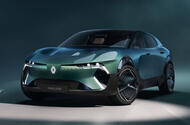Cameras are integrated into the wings to reduce drag
Striking concept car is a 4.8m-long coupé SUV claimed to emit 90% less carbon over its lifetime than today’s Captur
The new Renault Embleme concept shows how hydrogen fuel cell technology could offer long-range transport while emitting 90% fewer lifetime emissions than today’s petrol Captur and even 80% fewer emissions than the Megane BEV.
The follow-up to the Scenic Vision, it’s powered by a similar hydrogen-fuelled range-extender powertrain, pairing a 30kW fuel cell with a nickel-manganese-cobalt (NMC) battery.
Unlike the Toyota Mirai and Hyundai Nexo, whose batteries are smaller than 2kWh, the Emblème is designed to minimise the use of its fuel cell. Battery power is used around town, while hydrogen is consumed to refill its reserves as needed.
Renault said the system would allow the Emblème to do 1000km (621 miles) in the same time as a current ICE car, assuming two five-minute stops to brim the 2.8kg hydrogen tank.
It added that on a journey from Paris to Marseille (think Aberdeen to London), some 75% of the electricity used would come from hydrogen.
While the Embleme is officially a concept, it is built on the Ampr Medium platform used for the Megane and Scenic BEVs.
The Scenic was first revealed as a hydrogen concept before the production version, so it is possible a production version of the Embleme could eventually arrive with an electric powertrain.
It’s powered by a single electric motor mounted on the rear axle, which puts out 215bhp.
Renault claims that the Emblème weighs 1750kg, making it around 100kg lighter than the Scenic. Aerodynamics were prioritised in the design, with Renault borrowing methods and equipment from the Alpine Formula 1 team. Cameras replace drag-inducing mirrors, for example, while the underside is sealed flat and has an active diffuser.
To that end, Renault claims a drag coefficient of 0.25 – markedly better than the Megane’s 0.29.
The sum of the developments is a lifetime carbon emissions figure of five tonnes, down from the 24-tonne forecast for the Megane and 49 tonnes for the petrol Captur.
The Emblème will make its debut at next week’s Paris motor show, albeit without an interior.
Renault said that its EV development arm Ampere will unveil the car “in full” at the end of October.





